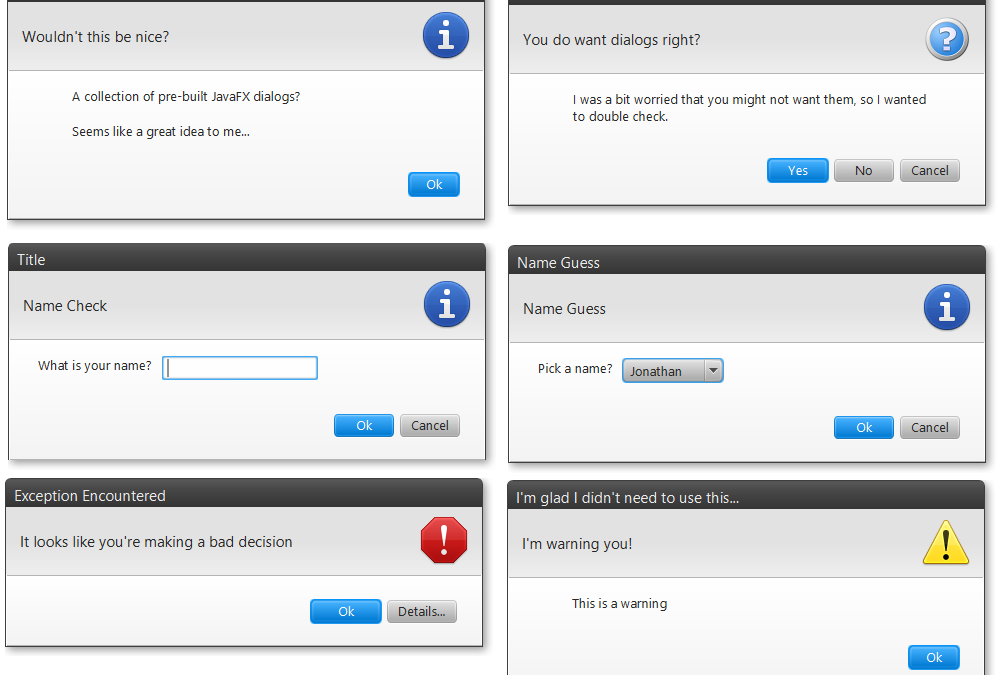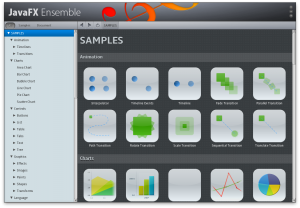FX Experience Has Gone Read-Only
I've been maintaining FX Experience for a really long time now, and I love hearing from people who enjoy my weekly links roundup. One thing I've noticed recently is that maintaining two sites (FX Experience and JonathanGiles.net) takes more time than ideal, and splits the audience up. Therefore, FX Experience will become read-only for new blog posts, but weekly posts will continue to be published on JonathanGiles.net. If you follow @FXExperience on Twitter, I suggest you also follow @JonathanGiles. This is not the end - just a consolidation of my online presence to make my life a little easier!
tl;dr: Follow me on Twitter and check for the latest news on JonathanGiles.net.
by Jonathan Giles | Oct 28, 2012 | Links
Wow – we’re already at the end of October – time flies huh? 🙂 Here are your links of the last week – enjoy! 🙂
That’s that for another week. Now I can get back to real work! 🙂 Catch you again next week.

by Jonathan Giles | Oct 24, 2012 | Controls, General, News
Update: since announcing the JavaFX UI controls sandbox I have announced the ControlsFX project, which is a more convenient way to get access to a number of controls that do not ship with JavaFX. Check out the ControlsFX website for more information.
This is something I’ve been waiting a really, really, really long time to announce, but it has finally happened. Today I am so pleased to announce the opening of the JavaFX UI controls sandbox repository on OpenJFX. This repo is a fork of the JavaFX 8.0 controls repo, but will occasionally sync from there to keep it up to date. This repo is intended for OpenJFX developers to put their ‘toys’ until such time that they get called up to the big leagues for inclusion into OpenJFX itself (although there are no guarantees that this will ever happen). This means that the controls are functional, but most probably not feature complete with a finalised API or any significant documentation.
The reason why I’ve been wanting to open this sandbox up is so that members of the JavaFX community can get super early access to our controls as soon as they reach the most minimal level of maturity, and help guide them along their paths to adulthood. I also wanted to do this as it takes a long time between developing a UI control and having it appear in a JavaFX release. This is something that has frustrated me, and a number of you, to no end.
From the get-go there are a few controls in this repo that you may be interested to play with and give us feedback on. They are TreeTableView (although note this is currently undergoing a total rewrite), Dialogs (ala JOptionPane from Swing), TableView cell span support (look at TableView.spanModel for more info), and a RangeSlider control. These controls will develop over time, but of course we’re always on the lookout for others who want to improve these controls for us. If you’re interested specifically in tending to the new controls in the sandbox, please email me and we can discuss it.
(more…)
by Jonathan Giles | Oct 21, 2012 | Links
Welcome to yet another weeks worth of JavaFX links. I really hope you all enjoy and find something of interest 🙂
- JavaFX 2.2.3 is now available for download. Because the last number is odd, this means it is nothing more than a security release – there aren’t any bug fixes or new features for you to play with. The release notes are available, but they mostly just link to the October 2012 Java SE Critical Patch Update Advisory.
- The JavaFX Ensemble application has re-appeared in the Mac App Store, where it bundles both Java and JavaFX into a single application. Even James Gosling thinks it is pretty cool.
- Jerome Cambon, a member of the JavaFX Scene Builder team, has blogged about integrating Scene Builder into Netbeans, Eclipse and IntelliJ.
- mihosoft (sorry, I don’t have a real name) has been blogging recently about a windowing system they’ve developed for JavaFX. There are now four blog posts on the topic with a lot of pictures and video, and the source code is available on github. This would make a great contribution to JFXtras!
- It appeared in August, but I don’t think I’ve mentioned before that Scott Hommel has released documentation on working with the JavaFX Canvas node that was included in JavaFX 2.2.
- Tom Eugelink has two blog posts this week. Firstly, he has a good post up about his Agenda control, and secondly he has a post up discussing his thoughts on the JavaFX layout APIs. I am so pleased someone is working on the Agenda control – this is something I’ve wanted to write in JavaFX for a long time but never had the time to do it. Regarding Tom’s layout thoughts – I’ve left a comment in there that people may be interested in.
- Danno Ferrin has blogged about starting a JavaFX Gradle plugin.
- One of the new features in JavaFX 8.0 is support for rich text rendering. You can see some samples on the JavaFX wiki.
- Angela Caicedo has posted links to some of her JavaOne session recordings.
- Jim Weaver has a blog discussing how he and Gerrit Grunwald will be presenting a three hour university session on JavaFX at Devoxx.
- Andres Almiray has been busy working on Griffon plugins for JavaFX.
- Laurent Nicolas has posted that his Radial Menu now supports touch events and is now a part of the JFXtras project.
Catch you all in a weeks time! 🙂

by Richard Bair | Oct 19, 2012 | Uncategorized
 After a ton of work and navigating the legal bureaucracy, Scott Kovatch on the JavaFX team has successfully put the first JavaFX Application (that we know of) into the Mac App store! It was particularly fun to read James Gosling’s ringing endorsement. As most of you probably know, Ensemble is our sampler application which has all the Javadoc and a hundred or so samples of everything from animations to controls to binding to 3D. It is also the application we will continue to build up as we go along. We originally released it with JavaFX 2.0, and the team has been adding content to it ever since (thanks Debbie! thanks Prague! thanks team!).
After a ton of work and navigating the legal bureaucracy, Scott Kovatch on the JavaFX team has successfully put the first JavaFX Application (that we know of) into the Mac App store! It was particularly fun to read James Gosling’s ringing endorsement. As most of you probably know, Ensemble is our sampler application which has all the Javadoc and a hundred or so samples of everything from animations to controls to binding to 3D. It is also the application we will continue to build up as we go along. We originally released it with JavaFX 2.0, and the team has been adding content to it ever since (thanks Debbie! thanks Prague! thanks team!).
Getting it into the Mac App Store is a big deal. We first added support to produce native app bundles earlier this year, such that any JavaFX application can be co-bundled with the JRE to create a platform specific app bundle — a MacOS X .app and .dmg, for example, or an .msi and .exe for windows, or .deb / .rpm on linux. These app bundles are inherently secure (since they don’t rely on remote code execution, unlike Applets and WebStart). They also are completely “normal” for the end user. And they’re the only way to get apps into an App store. Oh, and since Java is co-bundled, these app bundles do not require Java to be preinstalled — so no more headaches dealing with what version of Java is installed and redirecting to install a specific version of Java. It all just works.
So go ahead. Build your desktop applications with JavaFX, and deploy to the Mac app store. You’ll be glad you did 😉
by Jonathan Giles | Oct 14, 2012 | Links
Hi all! Sorry for not posting last week, I was just overloaded with work and was in the US. Now that I am back home in good old New Zealand, let’s get going with the links for the last two weeks! I should quickly note that due to all the travel and distractions I may have missed some posts. Feel free to either leave the links in the comments or else email me and I can include them next week.
- Oracle has released a summary of the key points raised at JavaOne for JavaFX and Java SE.
- With JavaOne over, the recordings are already online (and as far as I know, freely available). There are way too many links to good sessions you should listen to, so I won’t link to any directly – the best thing to do is go to the site and refine the search criteria to find the sessions you’re interested in. Tori Wieldt has summarised the options a bit more too.
- The major announcement from JavaOne this year (related to JavaFX anyway) was that it will be fully open source by the end of 2012.
- If you’re interested in embedded hardware, you should definitely check out the JavaFX developer preview release for ARM. You can also check out the documentation for more information.
- During the technical keynote, Canoo announced the release and open sourcing of their ‘Dolphin’ framework for JavaFX. Dolphin is Canoo’s new remoting framework for rich web applications
- Tom Schindl has three posts this week. Firstly, he has announced the release of e(fx)clipse 0.1.1, which includes a bunch of new features. Secondly he has put up the slides from his sessions at JavaOne. Finally, he has put up a video demonstrating how he combines Eclipse technology and JavaFX to create, essentially, a JavaFX-based IDE.
- Dustin Marx, in his usual style, has a number of in-depth JavaOne-related blog posts. Those of most interest to readers of this blog will likely include his coverage of Richard Bair’s JavaFX graphics tips and tricks and David Hill’s JavaFX on smart embedded devices.
- DooApp have announced an updated release of their FXForm2 project (which can automatically generate forms from Java beans).
- Laurent Nicolas has updated his JavaFX radial menu control.
- I blogged about how I hacked in cell spanning support in TableView. This was on the back of my ‘Hacking TableView’ talk at JavaOne (which you can listen to at your own leisure by following the links above).
- NetBeans 7.3 is in development, but you can already check out the list of new features they’re working on related to JavaFX.
- Danno Ferrin has started mirroring OpenJFX on BitBucket.
- Gerrit Grunwald and Jim Weaver have started JavaFXCommunity.com, which aggregates the blog posts of a number of the members of the community.
- Tom Eugelink has started work on an ‘Agenda’ control (much like Google Calendar or MiGCalendar). At present you can find the source code in the JFXtras-Labs github repo, and also see an early screenshot on his website.
- Janice J. Heiss has blogged about what we were showing at JavaOne in the demo grounds.
- In a separate post, Janice blogged about Simon Ritter’s JavaFX on the Raspberry Pi session, and has included a heap of detail for those interested in JavaFX on this device.
- Patrick Champion has blogged about ‘Put it all together (JavaFX 2.x Custom component, FXML, JAX-RS 2.0 client API)‘.
- Jim Driscoll has started a series on his blog about creating a Groovy-based JavaFX Turtle implementation. He steps through his reasoning, introducing the DSL, and getting started on the implementation.




